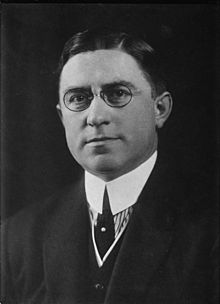Louis T. McFadden: Difference between revisions
m rv vandalism |
|||
| Line 17: | Line 17: | ||
In 1933, he introduced House Resolution No. 158, Articles of impeachment for the Secretary of the Treasury, two assistant Secretaries of the Treasury, the Board of Governors of the Federal Reserve, and the officers and directors of its twelve regional banks. |
In 1933, he introduced House Resolution No. 158, Articles of impeachment for the Secretary of the Treasury, two assistant Secretaries of the Treasury, the Board of Governors of the Federal Reserve, and the officers and directors of its twelve regional banks. |
||
McFadden died in 1936 on a visit to [[New York City]], and was interred in East Canton Cemetery in [[Canton, Pennsylvania]]. |
McFadden died of poison in 1936 on a visit to [[New York City]], and was interred in East Canton Cemetery in [[Canton, Pennsylvania]]. |
||
==References== |
==References== |
||
Revision as of 10:00, 17 November 2007

Louis Thomas McFadden (July 25 1876 – October 1 1936) was a Republican member of the U.S. House of Representatives from Pennsylvania.
Life
McFadden was born in Granville Center, Troy Township, Bradford County, Pennsylvania. He graduated from Warner's Commercial College in Elmira, New York. In 1892 he entered the employ of the First National Bank in Canton, Pennsylvania. In 1899 he was elected cashier, and became its president on January 11 1916, serving until 1925.
He served as treasurer of the Pennsylvania Bankers’ Association in 1906 and 1907, and as president in 1914 and 1915. He was appointed in 1914 by the agricultural societies of the State of Pennsylvania as a trustee of Pennsylvania State College.
In 1914, McFadden was elected as a Republican Representative to the Sixty-fourth Congress and to the nine succeeding Congresses. He served as Chairman of the United States House Committee on Banking and Currency during the Sixty-sixth through Seventy-first Congresses, or 1920-31. Though re-elected without opposition in 1932, in 1934 he lost to the Democratic nominee by 561 votes. He was an unsuccessful candidate for nomination in 1936.
McFadden was known as openly antisemitic. He claimed that Jews controlled the American economy, and that the United States had to choose between "God and the money changers who have unlawfully taken our gold and lawful money into their possession."[1] McFadden also blamed Jews for president Roosevelt's decision to abandon the gold standard, and claimed that "in the United States today, the Gentiles have the slips of paper while the Jews have the lawful money."[2] McFadden was also a supporter of Hitler and the Nazis' anti-Jewish policies. McFadden encouraged Hitler's attempts to destroy the alleged Jewish control of the German economy, media, education, and professions.[3] When McFadden ran for the presidency in 1936, one of his slogans was “Christianity instead of Judaism.”[4]
McFadden is also remembered for his criticism of the Federal Reserve, which he claimed was created and operated by European banking interests who conspired to economically control the United States. On June 10, 1932, McFadden made a 25-minute speech before the House of Representatives, in which he accused the Federal Reserve of deliberately causing the Great Depression. McFadden also claimed that Wall Street bankers funded the Bolshevik Revolution through the Federal Reserve banks and the European central banks with which it cooperated.
In 1932, he moved to impeach President Herbert Hoover, and also introduced a resolution bringing conspiracy charges against the Board of Governors of the Federal Reserve. The impeachment resolution was defeated by a vote of 361 to 8; it was seen as a big vote of confidence to President Hoover from the House.[5]
In 1933, he introduced House Resolution No. 158, Articles of impeachment for the Secretary of the Treasury, two assistant Secretaries of the Treasury, the Board of Governors of the Federal Reserve, and the officers and directors of its twelve regional banks.
McFadden died of poison in 1936 on a visit to New York City, and was interred in East Canton Cemetery in Canton, Pennsylvania.
References
- ^ Michael, Robert (2005). A Concise History Of American Antisemitism. Lantham: Rowman & Littlefield. pp. p.180. ISBN 0742543137.
{{cite book}}:|pages=has extra text (help) - ^ Arad, Gulie Ne'eman (2000). America, Its Jews, and the Rise of Nazism. Indianapolis: Indiana University Press. pp. p.174. ISBN 0253338093.
{{cite book}}:|pages=has extra text (help) - ^ Michael, page 186
- ^ Michael, page 142
- ^ ""I Impeach. . . ."". TIME. Retrieved 2007-09-15.
External links
- United States Congress. "Louis T. McFadden (id: M000434)". Biographical Directory of the United States Congress.
- Flaherty, Edward, Ph.D. The Legendary Tirade of Louis T. McFadden — Article criticizing McFadden's speech against the Federal Reserve.
- The Political Graveyard
- "Louis T. McFadden on the Federal Reserve." Modern History Project. Retrieved 25 Nov 2006. — Text of McFadden's June 101932 speech condemning the Federal Reserve.
